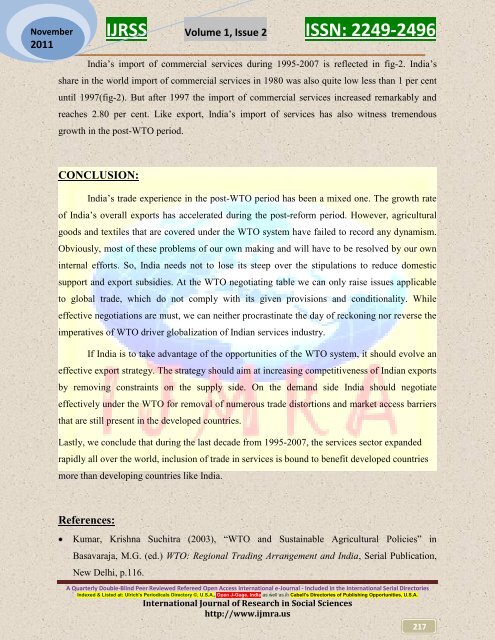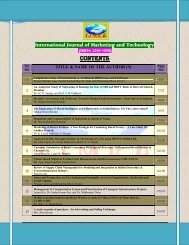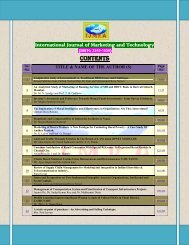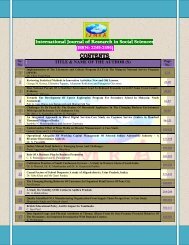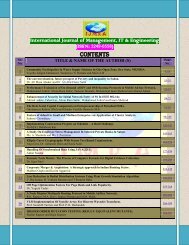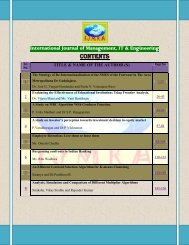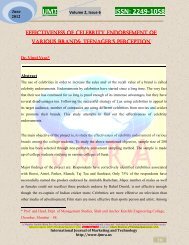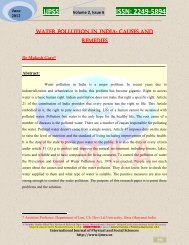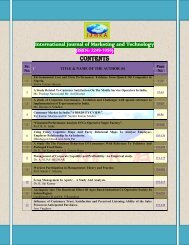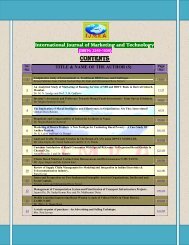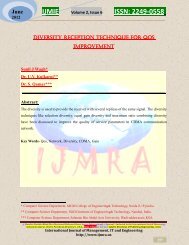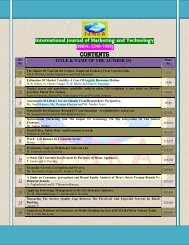Donload full Lenght Paper...... - International Journals of ...
Donload full Lenght Paper...... - International Journals of ...
Donload full Lenght Paper...... - International Journals of ...
- No tags were found...
Create successful ePaper yourself
Turn your PDF publications into a flip-book with our unique Google optimized e-Paper software.
November<br />
2011<br />
IJRSS Volume 1, Issue 2 ISSN: 2249-2496<br />
_________________________________________________________<br />
India’s import <strong>of</strong> commercial services during 1995-2007 is reflected in fig-2. India’s<br />
share in the world import <strong>of</strong> commercial services in 1980 was also quite low less than 1 per cent<br />
until 1997(fig-2). But after 1997 the import <strong>of</strong> commercial services increased remarkably and<br />
reaches 2.80 per cent. Like export, India’s import <strong>of</strong> services has also witness tremendous<br />
growth in the post-WTO period.<br />
CONCLUSION:<br />
India’s trade experience in the post-WTO period has been a mixed one. The growth rate<br />
<strong>of</strong> India’s overall exports has accelerated during the post-reform period. However, agricultural<br />
goods and textiles that are covered under the WTO system have failed to record any dynamism.<br />
Obviously, most <strong>of</strong> these problems <strong>of</strong> our own making and will have to be resolved by our own<br />
internal efforts. So, India needs not to lose its steep over the stipulations to reduce domestic<br />
support and export subsidies. At the WTO negotiating table we can only raise issues applicable<br />
to global trade, which do not comply with its given provisions and conditionality. While<br />
effective negotiations are must, we can neither procrastinate the day <strong>of</strong> reckoning nor reverse the<br />
imperatives <strong>of</strong> WTO driver globalization <strong>of</strong> Indian services industry.<br />
If India is to take advantage <strong>of</strong> the opportunities <strong>of</strong> the WTO system, it should evolve an<br />
effective export strategy. The strategy should aim at increasing competitiveness <strong>of</strong> Indian exports<br />
by removing constraints on the supply side. On the demand side India should negotiate<br />
effectively under the WTO for removal <strong>of</strong> numerous trade distortions and market access barriers<br />
that are still present in the developed countries.<br />
Lastly, we conclude that during the last decade from 1995-2007, the services sector expanded<br />
rapidly all over the world, inclusion <strong>of</strong> trade in services is bound to benefit developed countries<br />
more than developing countries like India.<br />
References:<br />
Kumar, Krishna Suchitra (2003), “WTO and Sustainable Agricultural Policies” in<br />
Basavaraja, M.G. (ed.) WTO: Regional Trading Arrangement and India, Serial Publication,<br />
New Delhi, p.116.<br />
A Quarterly Double-Blind Peer Reviewed Refereed Open Access <strong>International</strong> e-Journal - Included in the <strong>International</strong> Serial Directories<br />
Indexed & Listed at: Ulrich's Periodicals Directory ©, U.S.A., Open J-Gage, India as well as in Cabell’s Directories <strong>of</strong> Publishing Opportunities, U.S.A.<br />
<strong>International</strong> Journal <strong>of</strong> Research in Social Sciences<br />
http://www.ijmra.us<br />
217


